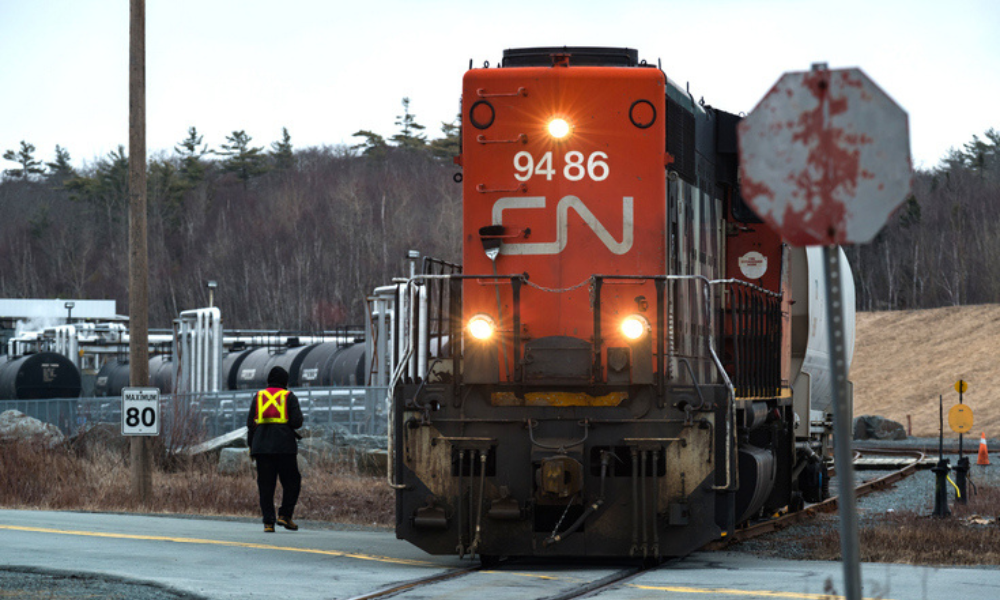
Railway cites 'unrealistic demands' of union after latest offer, calls for binding arbitration

Canadian National Railway (CN) and Canadian Pacific Kansas City (CPKC) have officially locked out employees represented by the Teamsters Canada Rail Conference (TCRC).
The lockout started at 00:01 ET and 00:01 MT.
The move came after the union did not respond to another offer by CN in a final attempt to avoid a labour disruption, according to CN.
“This offer improved wages and would have seen employees work less days in a month by aligning hours of service in the collective agreement with federally mandated rest provisions,” said the employer. “The offer also proposed a pilot project for hourly rates and scheduled shifts on a portion of the network as CN continues to believe this is a better and more predictable framework for our employees.”
CPKC, meanwhile, said that “a negotiated outcome with the TCRC is not within reach”.
“The TCRC leadership continues to make unrealistic demands that would fundamentally impair the railway’s ability to serve our customers with a reliable and cost-competitive transportation service,” said the railway company.
However, TCRC claimed that it has put forward multiple offers over the past several days and none “were seriously considered by either company”.
The main obstacles to reaching an agreement remain the companies’ demands, not union proposals, claimed Teamsters.
“Neither CN nor CPKC has relented on their push to weaken protections around rest periods and scheduling, increasing the risk of fatigue-related safety issues,” it said. “CN also continues to demand a forced relocation scheme, which could see workers ordered to move across the country, tearing families apart in the process.”
The union represents a combined 9,300 workers at the two railways.
On Wednesday, Metrolinx preemptively cancelled GO train service on the Milton line and at the Hamilton GO station for Thursday in anticipation of a strike or lockout at CPKC, according to a City News report.
Previously, rail workers employed by the two rail companies were given the green light to execute a strike. The Canada Industrial Relations Board (CIRB) ruled that a work stoppage by these workers would pose no "serious danger" to public health or safety, despite concerns around food security, fuel supply and water treatment, reported CTV News.
Now, both CN and CPKC believe that binding arbitration is the next logical step.
The “responsible path forward” for all stakeholders is for TCRC and CPKC to engage in binding arbitration to resolve all outstanding disputes,” said CPKC. “Binding arbitration is an effective, reasonable and fair process that ultimately has been used many times in the past to resolve disputes with this union.”
CN claims it offered to voluntarily submit to binding arbitration in June.
Binding arbitration is a process where both parties empower a mutually agreed upon independent arbitrator to determine the terms of a settlement.
However, on Monday, New Democratic Party (NDP) Leader Jagmeet Singh warned that his party would oppose government intervention in the ongoing negotiations.
"I want to send a clear message to Justin Trudeau and the Liberals. We will oppose any attempt of the federal government to intervene on behalf of the employer against the workers in which should be a negotiated agreement between workers and the employer for good wages and safe working conditions," he told reporters in Halifax, according to CBC.
"For too long we have seen Liberals and Conservatives interfere in these types of labour disputes to the advantage of the employer, to the detriment of the worker. That is wrong and we will oppose that."
On Wednesday, hours before the lockout, the Canadian Chamber of Commerce called on the federal government to take immediate action to ensure the continuation of rail services.
“Under section 107 of the Canada Labour Code, the Minister of Labour can refer the dispute to the Canada Industrial Relations Board (CIRB) for binding arbitration and prohibit a strike, lockout or end any ongoing stoppage pending a resolution. Alternatively, the government can also reconvene Parliament and introduce back-to-work legislation,” the group said.
This is “not about siding with either party; it is about standing up for Canadians,” said the chamber of commerce.
“The federal government must show leadership and act before our trains – and with them, our economy – grind to a halt. Otherwise, the steep price of inaction will be paid by Canadian families, workers, and businesses.”
Steve MacKinnon, Canada’s labour minister, recently met with the parties and federal mediators and urged the two employers and the union to “fulfil their responsibility to Canadians, reach agreements at the bargaining table, and prevent a full work stoppage”.
By Wednesday, however, issues between the parties involved "remain significant."
"The parties are still at the table, and we are making sure that they are focused on trying to get a deal,” he said, according to CTV News.